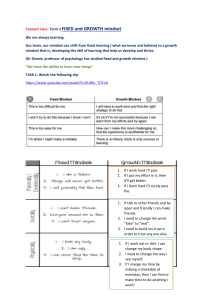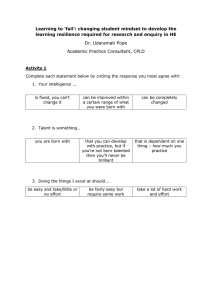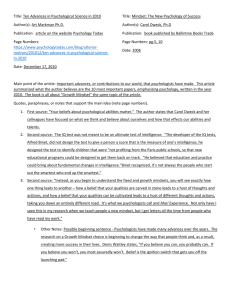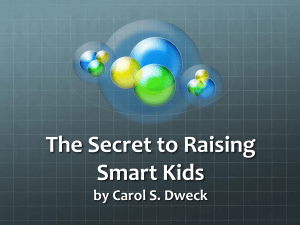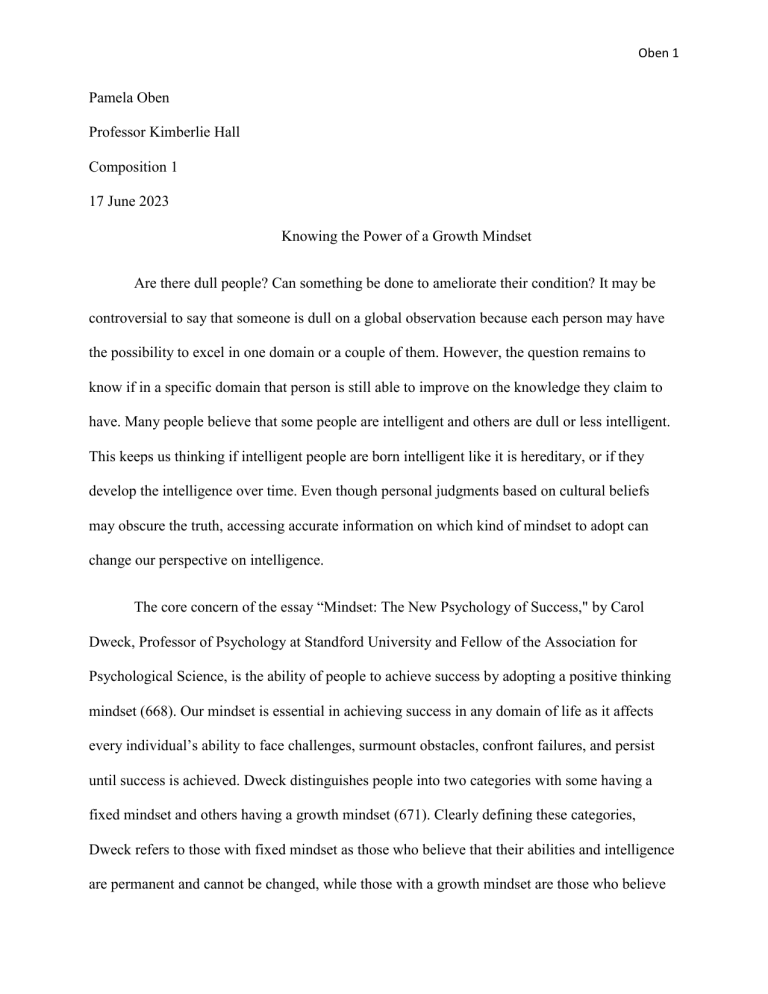
Oben 1 Pamela Oben Professor Kimberlie Hall Composition 1 17 June 2023 Knowing the Power of a Growth Mindset Are there dull people? Can something be done to ameliorate their condition? It may be controversial to say that someone is dull on a global observation because each person may have the possibility to excel in one domain or a couple of them. However, the question remains to know if in a specific domain that person is still able to improve on the knowledge they claim to have. Many people believe that some people are intelligent and others are dull or less intelligent. This keeps us thinking if intelligent people are born intelligent like it is hereditary, or if they develop the intelligence over time. Even though personal judgments based on cultural beliefs may obscure the truth, accessing accurate information on which kind of mindset to adopt can change our perspective on intelligence. The core concern of the essay “Mindset: The New Psychology of Success," by Carol Dweck, Professor of Psychology at Standford University and Fellow of the Association for Psychological Science, is the ability of people to achieve success by adopting a positive thinking mindset (668). Our mindset is essential in achieving success in any domain of life as it affects every individual’s ability to face challenges, surmount obstacles, confront failures, and persist until success is achieved. Dweck distinguishes people into two categories with some having a fixed mindset and others having a growth mindset (671). Clearly defining these categories, Dweck refers to those with fixed mindset as those who believe that their abilities and intelligence are permanent and cannot be changed, while those with a growth mindset are those who believe Oben 2 that their abilities and intelligence are developed through continuous hard work and dedication (672). Carol Dweck uses ethos, pathos, and logos to persuade her audience to adopt a growth mindset by employing a persuasive style and a blend of academic knowledge and personal experience to put forward her argument. Dweck uses ethos to establish her authority and competence in the field of psychology. As a Professor of Psychology at Stanford University and well-known for her research in motivation and mindset, she bases her claims in the essay on years of experience and research on the topic. Central to her essay, she states that “I've been studying for over 30 years, but it's still something that surprises and delights me. This growth mindset is based on the belief that your basic qualities are things you can cultivate through your efforts. Although people may differ in every which way- in their initial talents and aptitudes, interests, or temperaments- everyone can change and grow through application and experience” (672). Dweck uses her knowledge of the subject matter to establish her personality as a credible researcher and expert in the domain of psychology but goes further to pull the attention of the reader which takes away possible differences with her audience to explain that everyone can succeed if we put in the necessary efforts required. Her use of a mixture of first and second-person pronouns changes the formal tone to an informal conversation with her audience as a way of appealing to them on a level-ground discussion to adopt a growth mindset. Further use of ethos in her work is seen in references to joint research with her colleagues and other experts to support her claim when she writes, “Our research has shown that this comes directly from a growth mindset,” referring to the team of experts with whom she performs her researches (675). These references strengthen the credibility and expertise of Dweck which convinces the audience to adopt a positive mindset. Having established Oben 3 her credibility, Dweck then uses pathos by appealing to the emotions and feelings of her audience to make her argument. Dweck uses pathos by sharing stories of individuals who have achieved success despite the challenges by adopting a growth mindset. Dweck narrates the story of popular people who have achieved success in their domains when she asks if “… [we] know that Darwin and Tolstoy were considered ordinary children? That Ben Hogan, one of the greatest golfers of all time, was completely uncoordinated and graceless as a child?” and a host of others were unknown in their early years but became world-class famous people (673). These stories are emotional and will move everyone to believe that a change in their mindset, no matter their background, level of education, socioeconomic situation, or age. Another emotional narrative which can convince the audience is her personal story with her sixth-grade teacher, Mrs. Wilson, who seated them in class according to a fixed intelligence quotient (673). This was clearly a training destined to stigmatize them to believe that they were incapable of success and required to permit the ‘intelligent’ ones to occupy the best seats in class while they sat where they would wait for time to flush them out of the system. So many years after she fitted herself in the place of Mrs. Wilson as a teacher but was quickly motivated by her embarrassment in her early school years which encouraged her to pursue studies in developing the mindset for the sake of achieving success? The appeal is so emotional that some may want to try it even if they do not believe it at first, which could represent a logical way of convincing the audience but better statistical reports demonstrate this better. Dweck uses logos to support her argument that a growth mindset is essential to achieve success. One of her appeals to logos discusses the negative effects of a fixed mindset when she writes that “Believing that your qualities are carved in stone - the fixed mindset - creates an Oben 4 urgency to prove yourself over and over" (671). This is a logical statement because it suggests that a fixed mindset will always require someone or results to confirm their abilities or intelligence, thereby, slowing down growth. Furthermore, Dweck appeals to the audience with interviews reports, and presentation of raw experimental data to validate her argument (671-675). Participants demonstrate their attitude towards failure, challenges, and at what price and time success comes (674). The numerous examples cited by Dweck are a load full of logical outcomes, good enough to convince the audience to adopt growth mindsets. The statement also suggests that success is not solely based on innate ability but also effort as compared to those of the fixed mindset who believe that abilities and intelligence are innate. Carol Dweck uses a persuasive style that combines ethos, pathos, and logos to convince her readers to embrace a growth mindset as the better way of achieving success in any domain. The use of ethos established the credibility of the author, Dweck, on both her personal experiences and academic expertise. Her use of pathos and logos presents a compelling argument that summons emotion and feeling as a motivation to break loose the ‘stone-headed’ judges with fixed mindsets, and a logical presentation of facts and reports. That encourages individuals to believe in their ability to develop their intelligence and skills. Through her persuasive style, Dweck effectively communicates the benefits of adopting a growth mindset and inspires her audience to take action toward achieving their goals. Oben 5 Works Cited Dweck, Carol. “Mindset: The New Psychology of Success.” From Inquiry to Academic Writing: A Text and Reader, 5th ed. Edited by Stuart Greene and April Lidinsky. Bedford/St. Martin’s, 2021. pp. 668-677.
